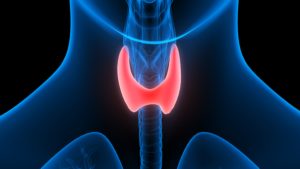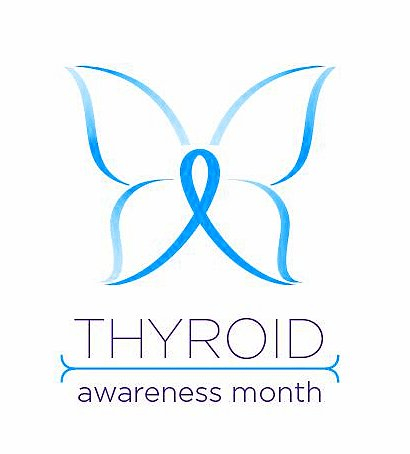January is National Thyroid Awareness Month!
And that means it’s the perfect time to talk about Hashimoto’s.
You may be wondering – why is a gut health dietitian talking about thyroid health? That’s not what she does.
Allow me to connect some dots…
First of all – the thyroid is that butterfly shaped gland at the front of your neck.

Most people have a friend or family member who has been diagnosed with an over-active or under-active thyroid. This is called hyper-thyroidism and hypo-thyroidism respectively. However, two other major issues often happen with the thyroid: the autoimmune disease Graves disease and Hashimoto’s thyroiditis.
What differentiates these from simply having an over or under active thyroid? The autoimmune piece – when the body attacks the thyroid and causes damage.
I’m going to spend some more time focusing on Hashimoto’s as this is what I see most often in my practice AND also what I am currently healing from myself.
Hashimoto’s Thyroiditis
Some symptoms of Hashimoto’s:
Hair Loss
Loss of outer 1/3 of the eyebrow
Anxiety/Depression
Brain Fog/ Memory issues
Fatigue
Insomnia
Swelling/puffiness around the eyes
High Cholesterol
Hormone Imbalances
Menstrual Disturbances
Weight Gain
Muscle Weakness
Nerve Pain
Low Immunity
Cold Intolerance
Constipation
Are these symptoms sparking something in you? If you’re looking to get a comprehensive test of Hashimoto’s you’ll want to request from health care provider a FULL THYROID PANEL that will include the antibodies (anti TPO and anti TG) that will determine the autoimmune piece.
Hashimoto’s is an autoimmune disease where the body creates anti-bodies that essentially target and damage the thyroid. So, we should ask ourselves, why is the body attacking itself? That’s not normal…(some of you need to be reminded of that). Some of the answers to that question is the exploration of Root Causes.
In the realm of Functional Nutrition, there is a lot of talk about Root Causes in relation to autoimmune diseases and Hashimoto’s is no different.
Potential root causes to explore for those with Hashimoto’s:
 Food Sensitivities: Consider some of the more obvious triggers like gluten, soy, or dairy as well as less common sources like particular fruits, vegetables, or protein sources.
Food Sensitivities: Consider some of the more obvious triggers like gluten, soy, or dairy as well as less common sources like particular fruits, vegetables, or protein sources.
 Gut Imbalances: Parasites, bacterial overgrowth, lack of keystone species, yeast overgrowth, maldigestion of food, inadequate stomach acid, leaky gut, SIBO…the list goes on!
Gut Imbalances: Parasites, bacterial overgrowth, lack of keystone species, yeast overgrowth, maldigestion of food, inadequate stomach acid, leaky gut, SIBO…the list goes on!
 Nutritional Deficiencies: These could be a result of either from not consuming adequate nutrients or your body’s inability to consume the nutrients you are providing it.
Nutritional Deficiencies: These could be a result of either from not consuming adequate nutrients or your body’s inability to consume the nutrients you are providing it.
 Stress: This topic is so over-discussed it can be hard to really hear and take action about. However, it doesn’t change the fact that it’s a huge player and an absolute root cause of autoimmune diseases.
Stress: This topic is so over-discussed it can be hard to really hear and take action about. However, it doesn’t change the fact that it’s a huge player and an absolute root cause of autoimmune diseases.
 Toxic Burden: Second hand smoke isn’t the only dangerous “toxin” here. This topic includes unidentifiable toxins in the air, water, and soil as well as the known ones that enter the body through personal care products, cleaning products, and cookware.
Toxic Burden: Second hand smoke isn’t the only dangerous “toxin” here. This topic includes unidentifiable toxins in the air, water, and soil as well as the known ones that enter the body through personal care products, cleaning products, and cookware.
 Infections: Thinking about possible gut infections (H.Pylori), previous infections (EBV, Epstein Barr Virus), food poisoning, etc…anything that is either currently lingering in your body or has caused some sort of negative aftermath in the wake of being infected. Also important here is the fact that a lot of times to clear up these infections, we are prescribed antibiotics. That has an effect on the entire body, in particular the gut. With few exceptions, antibiotics cannot differentiate the bacteria they kill off so the good, bad, and the ugly are all fair game!
Infections: Thinking about possible gut infections (H.Pylori), previous infections (EBV, Epstein Barr Virus), food poisoning, etc…anything that is either currently lingering in your body or has caused some sort of negative aftermath in the wake of being infected. Also important here is the fact that a lot of times to clear up these infections, we are prescribed antibiotics. That has an effect on the entire body, in particular the gut. With few exceptions, antibiotics cannot differentiate the bacteria they kill off so the good, bad, and the ugly are all fair game!
Let’s break down some of the root causes:
This is how I like to think about this in terms that seem like I can grasp them:
What might be happening that is preventing the body from running optimally? Because THOSE are the pieces where changes can be made that can ultimately help the body stop attacking itself. And that’s how we will think about this when we take a look at why the root causes are what they are.

Food Sensitivities
Not an allergy. A food intolerance or sensitivity is not the same as an allergy because the mechanisms that get released in the body are literally different. A food sensitivity will manifest differently for everyone but may include symptoms such as:
Headaches/Migraines
Joint Pain
Bloating
GERD/Acid Reflux
Abdominal Pain
Brain Fog
Anxiety/Depression
Do you notice a lot of overlap here with the symptoms of Hashimoto’s? Not to say that these DIRECTLY are the singular cause of any autoimmune diseases, but it becomes more clear how they are connected.
So what do you do about this? The most difficult part is identifying the sources.
Food sensitivities can manifest in the body up to 72 hours after you ingest the food that causes the reaction.
So, you can see how if you get a headache after you eat an apple on Thursday, you may very reasonably think, “oh good, apple is clearly a food that I’m having a reaction too. I’ll cut it out”. Then, you get another headache the next day even when you didn’t have an apple and the whole time, it was never the apple on Thursday that was the issue, it was the soy you ate Monday night that just showed itself on Thursday! Does that make sense?
It can be SO difficult to isolate the problems in order to cut them out. However, here are some options for you:
- You can test! I like this approach the best. I use this approach with my clients to help mainstream the process and cut down on the guess work. It’s not a perfect, black and white solution (nothing ever is) but it’s a HUGE jump start. Without going into details, not all food sensitivity tests are created equal. You get what you pay for most of the time and you should do your research before committing to a “deal”.
- You can play around with this on your own! You can run your own personal elimination diet by making a list of the foods your suspect are the issue, cutting them all out together, and then slowly adding them back in to observe the affect it has on you. This is a bit of a detailed process but stay tuned for the next blog that will provide tons of guidance on this.
So, what is the actual issue that food sensitivities cause that make them problematic in the first place. When testing for food sensitivities, what is being tested is the level of inflammation a food illicits when it is consumed. So it is the inflammation they cause that’s problematic. Therefore, by addressing these inflammatory foods, you are systematically decreasing the amount of inflammation your body is fighting against. In turn, this can help to lower the number of anti-bodies that are produced!
 Gut Health
Gut Health
This topic is SO huge. There are so many variables when it comes to gut health. There are a lot of “what came first, the chicken or the egg” questions when diving into the gut because things are so interconnected. “Did food sensitivities cause leaky gut or did leaky gut cause the food sensitivities?” “Are you not digesting well because you have a large toxic burden on the liver or because you have low stomach acid?”
It’s such a exploration and research is turning out new information all the time. What we do know is that it is 100% connected to autoimmune diseases.
70% or more of the immune system resides in the gut. Therefore, the health of the gut determines, in part, the health of the immune system. Addressing issues in the gut, addresses issues with the immune system and can therefore have a beautiful change on an autoimmune disease.
Some things that can be tested for and explored in terms of healing are:
-Bacterial overgrowth (if this is in the small intestine, we call this SIBO – small intestinal bacterial overgrowth)
-Lack of appropriate beneficial bacteria in the gut (clue: just taking a probiotic will not change this)
-Maldigestion – this could be from lack of pancreatic enzymes, damage to the gut lining and the brush border enzymes that exist there, low stomach acid (hypochlorhydria), gallbladder or liver stress
-Leaky Gut – there are some functional doctors who will go so far as to say that anyone who has an autoimmune disease also has leaky gut. There isn’t any research that specifically supports this but in clinical practice, this is absolutely something very commonly observed
-Parasite infections, bacterial infections, viral infections (some of these can be really nasty and even if you take antibiotics to clear them out, the aftermath can be messy)
-Yeast overgrowth – like bacteria, yeast is a natural part of the gut microbiome, but too much of it (like bacteria) and you’re gonna know it

Nutritional Deficiencies
There are many reasons why we can become deficient in any number of vitamins, minerals, amino acids, co-factors, fatty acids, etc…
- Simply not consuming them in food,
- Thinking that we are consuming them but the quality of the soil the food was grown in was poor and therefore the plants are not nutritional optimal,
- An animal that was raised with antibiotics, hormones, and/or eating grains that were grown with glyphosate and/or other chemicals,
- The body is not absorbing properly – cellular inflammation or damage that prevents the cells in the body from being able to uptake the nutrients,
- The nutrients are being depleted at a faster rate than they are being consumed due to damage, inflammation, bacterial overgrowth, toxic burden,
- Some nutrients are produced in part by the bacteria in the gut – if these bacteria are being crowded out by undesirable organisms in the gut, it usually will reflect in your nutrient profile (B Vitamins and Vitamin K are very common in this category),
- Don’t forget about the sun! Our best source of Vitamin D comes from being made in the skin by the sunlight. Most people either don’t get any sun at all during the hours that it would be most beneficial. Or, they slather on sunscreen blocking the rays from being able to do some Vitamin D magic.
- Genetics – this is always a key player. Some genetic mutations play a role in how well nutrients are able to be absorbed – ever heard of the MTHFR gene? Certain mutations to this particular gene prevent B vitamins from being methylated (which is what needs to happen in order for the body to absorb them).
So what the heck are you supposed to do with all of this information?
You can get a micronutrient panel. Normally you have to work with a practitioner to get something like this done. From here, you can supplement directly with what you are deficient in.
Most importantly, take a look at your food! Are you eating good sources of protein that are raised in a healthy way? Are you getting any organic vegetables or locally grown produce? Are you eating in season or downing those strawberries in February? Do you eat colors in your food other than white and green?
Coming soon to the blog are some fabulous resources for getting better sources of food without breaking the bank!

Stress
I’ll paint a picture for you to boil this down:
Stress—>suppressed stomach acid—>bacteria, parasites, yeast, etc…enter the body through our soil, food, air, pets, etc…—>inadequate stomach acid present to kill them off—>they get a chance to colonize and start damaging things
Stress—>suppressed stomach acid—>(stomach acid is a signal to the pancreas and gallbladder to release digestive enzymes and bile in preparation to digest and absorb food)—>this signal doesn’t get triggered—>you don’t digest food properly—>you feel pain, discomfort, bloating, start to feed bad bacteria–>bacteria starts to overgrow and causes even more negative symptoms
We all KNOW that stress plays a role in our health. We hear it on loop all the time and it’s so overwhelming that we hardly even pay attention to it anymore.
The sequences above do a really great job of illustrating why we hear that message of “decrease stress” all the time. It’s not enough to simply know that is true, it takes understanding the underlying mechanisms to really want to take action.
Take a quick peek at my post on Adaptogenic Herbs for stress to start your journey down the rabbit hole…

Toxic Burden
What the heck does this even mean? It sounds like one of those snooty, irritating phrases that people use when they’re trying to sound smarter than they actually are.
That being said, this is an incredibly important, and often overlooked, topic.
Your toxic burden increases in 2 ways:
- With increased exposure to toxins
- With decreased ability to clear toxins
What clears out toxins? Your liver. So, if we can limit our exposure to toxins and simultaneously support the liver and its detoxification pathways, we can take a 2 pronged approach to dealing with toxins as an underlying root cause to Hashimoto’s.
How does this connect to a thyroid autoimmune condition? The liver has MANY different responsibilities: clearing out toxins, clearing out hormones, metabolizing fructose, making bile to send to the gallbladder for storage, processing alcohol are just a few of them. When it doesn’t have the ability to balance what it needs to do with ease, it causes chronic inflammation which can cause our bodies to start attacking themselves…enter, Autoimmune Diseases like Hashimoto’s
Detoxification Pathway
The crazy thing about the detoxification pathway is that half way through the process, after Phase 1, compounds are actually MORE toxic than they were before entering the pathway! The liver REQURES the addition of antioxidants from the diet at this point to keep things under control and continue the process of detoxification into phase 2.
You don’t ever need to “do a detox” or a “cleanse”. Your liver literally exists for this particular purpose. What you “need to do” is support the liver so it can just do its job!
When the liver is overtaxed and unsupported, you guessed it = inflammation.
Are you seeing a trend with inflammation and autoimmune disease yet?
Infections
This topic can be a little tricky. It can be harder to pinpoint infections because often times it requires testing. However, if you KNOW that you were sick with something specific, you have a leg up here. I’m thinking food poisoning, strep throat, anything that you had to take antibiotics or antivirals for, Epstein Barre Virus/Mono.
Infections can cause damage during the actual infection period. In a sneakier way, the aftermath of clearing or healing from the infection can be just as damaging.
One major infection I see ALL THE TIME (and also literally currently am on a protocol to get rid of) is H.Pylori or Helicobacter Pylori.
A SUPER common bacterial infection, it is estimated that something like 50% of people are actually infected with HPyloi. Oftentimes, it can be asymptomatic. However, it is a known trigger for Hashimoto’s.
HPylori is a spiral shaped bacteria that lives in the lining of the stomach. While there, it often causes low stomach acid. As we discussed above, suppressed stomach acid has tons of downstream negative effects on digestion and gut balance. If you’re stressed on top of this – you’ve got a real magical combo to work against.
How do you test for HPylori? A stool sample test or a breath test. A GI doc can normally help you out with this. A dietitian who specializes in gut health should also have a way to get this testing to you.
IMPORTANT: H.Pylori is spread through saliva (which is why so many people are infected with it). If you identify through testing that you have HPylori, be sure to have your partner tested as well so you don’t continue to pass it back and forth. Also be SUPER mindful of sharing spoons and cups with your kids, siblings, friends.
This is a lot of information for someone who is new to Hashimoto’s and looking for ALL the ways to tackle their journey. Stay tuned for the next blog coming at the end of the month with all the ACTIONABLE pieces to match this information. We’ll be talking about really amazing specifics correlated with each category that will translate into very reasonable day-to-day tricks for you to use (I use them every day!)
If you want some other resources on this topic, I love diving into Aviva Romm’s information. This will also be the topic of discussion for this month on IG so tune in there for some more details!
Cheering for your health friends,
Kylie Fagnano, MS, RDN, LDN, IFNCP, CLT
